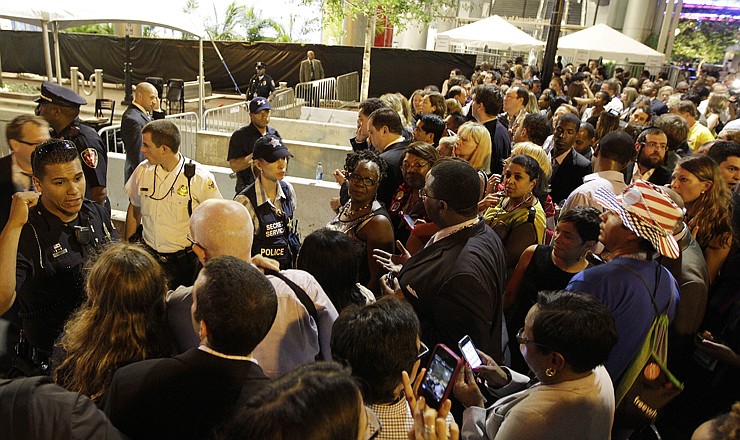CHARLOTTE, N.C. (AP) - As dozens of protesters blocked a busy intersection near the Democratic National Convention in Charlotte this week, they were surrounded and outnumbered by heavily armed police officers who appeared ready to move in.
When the situation was resolved with a conversation instead of a confrontation, it helped demonstrate why the tallies of arrests have stayed low at this year's national political conventions.
Police have balanced overwhelming shows of manpower with flexibility during the Democratic convention and last week's Republican National Convention in Tampa, helping to keep the number of people arrested or detained at 21 and 2, respectively. Another big factor has been lower-than-expected turnout for protesters, who have also stopped short of the mayhem that unfolded at other conventions in recent years.
Neither of this year's conventions has had violence or significant property damage. By contrast, more than 800 people were arrested at the Republican National Convention in 2008, and another 150 at the Democratic convention that year.
The impasse during the roadblock Tuesday in Charlotte was resolved when a protester asked to speak to the police chief, and they worked out a deal to allow the group to continue walking through the city's central business district. Police could already have pounced on the group for infractions ranging from marching without a permit to wearing masks - not to mention the two hours they spent blocking the road.
"It's all about communication," Charlotte-Mecklenburg Police Chief Rodney Monroe said. "You have to watch what's going on, be prepared. But you don't want to be too aggressive."
A former longtime law enforcement officer who runs a Tampa security company said if thousands of protesters had shown up, he expects police there and in Charlotte would have made many more arrests.
"That's what mob mentality does. You do things you wouldn't normally do," said Rod Reder, a former deputy commander for the Hillsborough County sheriff's office.
He also credited the deft use of security tactics that have evolved over the years, along with officers' overall restraint.
"They probably prevented a ton of arrests by talking to the demonstrators, communicating with them. It doesn't mean the departments are weak," he said.
At this year's Republican convention in Tampa, plans for massive protests fizzled due to foul weather from Hurricane Isaac's outer bands. The largest protest drew about 500 participants. Still, there were enough feisty demonstrators to test officers' patience.
When a group of protesters refused to get up from their sit-in in the middle of a busy intersection in downtown Tampa, an assistant chief squatted down and chatted with them. A minute later, the protesters stood up and moved to the sidewalk. In another instance, when three protesters chained themselves together at a power plant, authorities sawed through the chains but told the entire protest group that no one would be arrested if they left peacefully. No one was arrested.
Officers even took leftover food to Romneyville - the tent city on the edge of downtown.
Tampa Police Chief Jane Castor said her strategy was to communicate directly with the protesters, find out their goals and then let them accomplish them as long as it didn't involve anything illegal.
"Everyone was to be treated with dignity and respect," Castor said.
While officers' demeanors have helped things go smoothly, their overwhelming numbers have been perhaps the more important deterrent.
Walking through the two cities during the conventions, attendees were likely to see armed police at nearly every street corner and major building. Eight foot steel barricades and checkpoints manned by heavily armed officers ringed government buildings and the convention venues, while police helicopters thudded overhead. Large squads of officers riding bicycles and mounted on horses responded quickly to any report of trouble.

